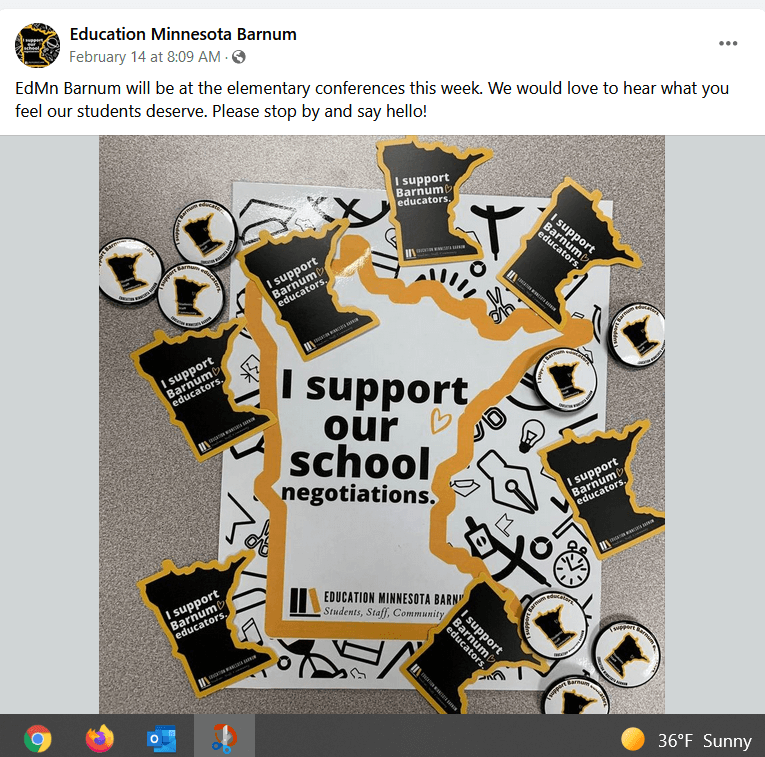Most local unions across Minnesota either recently settled or are still trying to settle their 2021-23 contract. Many are using their contract to make important changes in order to support their members and their schools. Four locals shared their stories with the Minnesota Educator.
Lake Park-Audubon
Changes in district leadership last summer made Education Minnesota Lake Park-Audubon’s negotiations complicated, but they persevered to get a fair contract.
“This is the second time our superintendent has changed during negotiations, which makes us start over,” said Raina Askin, teacher and negotiator. “But this year for the first time, the district brought in a lawyer.”
The district team also came to the table with 38 pages of edits, thanks to a review of their contract by the Minnesota School Boards Association.
“Thankfully they realized they couldn’t make all those changes,” said Amanda Snyder, local co-president and negotiator.
“It did make our membership very nervous initially,” Askin said. “Our contract is long because of our district consolidation, but there is history in that contract.”
Salary is always a top priority, specifically catching up to surrounding districts, said Askin.
“About 10 years ago, the teachers were asked for a pay freeze and didn’t get a step,” she said. “Then we had a few years of ‘less than 1 percent.’ People can hop to the next district and make $10,000 more.”
After a long negotiations process, the union got an agreement they could feel good bringing to members.
The union got a $1,500 increase on each cell, an overall 2 percent increase this year and 2 percent next year.
“For the first year, depending on what cell placement you are, that could be about a 4.3 percent increase,” said Askin.
The local also got some good language changes on leave, including adding a reference to pandemic leave in their sick leave bank and sick leave at retirement going into a 403(b) account.
Wrenshall
In Wrenshall, a huge focus of the local union has turned to lifting up the voices and stories of their members.
The local has started highlighting members and who they are, as well as things happening within their schools, on their Facebook page.
“It was time to get out there and let the community know what we’re doing and the value that we add,” said Denise North, Education Minnesota-Wrenshall president.
As of press time, the local is heading into mediation for contract negotiations, but North hopes that the communication strategy will continue after bargaining.
“We’re not always getting a huge amount of interaction, but we know people are reading them,” North said. “People say they like seeing the posts, so we know we’re educating the public.”
North said one member sent out a Google form for people to fill out with what information they would like shared.
The local also meets on a regular basis, not just on bargaining but education issues and what’s going on in the district.
“The work and effort that we’ve put into our kids having a safe space either virtually or in person was a big catalyst for us coming together more,” said North.
Wrenshall also started communicating with neighboring district, Barnum, about their negotiations.
“We are both still without a contract,” North said. “One of our members is a parent in Barnum so they spoke at a board meeting and a couple of our members went to the meeting too. We want to be that visual that we are working together.”
Barnum
Education Minnesota-Barnum is trying a new strategy around negotiations—member organizing.

Kristen Helland and other members formed an organizing committee this year around contract negotiations. As of press time, the local was headed to mediation.
“Historically, we’ve never been able to settle a contract on time,” said Helland. “And when we do settle, it’s not great.”
In her 14 years in Barnum, Helland said her pay has been frozen two or three times and other contract increase never caught them up.
That frustration is what got Helland involved.
“I decided to get involved because if we just do what we’ve always done, we’re going to get what we always get,” she said.
The organizing committee worked with their Education Minnesota field staff and organizer to come up with a plan. The group meets regularly with them for support and ideas.
“We started pretty small and we’re still doing things fairly small,” Helland said.
The local started with getting everyone a union shirt and also having people wear black on Tuesdays, the day of school board meetings. The union has been going to school board meetings and speaking about how they feel as district employees.
“We try to highlight who we are and what our reality is,” said Helland. “We’re going to lose our teachers. We’re not feeling valued or supported.”
The local also is getting out into the community. They made buttons and stickers and hung posters on their classroom doors. They handed out snacks at conferences and basketball games with their union logo on it. They are trying to get more members highlighted on their Facebook page.
The local is also partnering with neighboring Wrenshall to support each other.
Helland hopes that this organizing and member engagement will soon become the norm in Barnum.
“Once we get through negotiations, we’ll talk about how we plan long term,” she said. “We’ve been emergency organizing. We need to build a strong infrastructure.”
Northfield
Northfield teachers wanted to focus their negotiations efforts on issues highlighted by the pandemic.
“While enduring the stress of a pandemic, our members really valued their time,” said Northfield Education Association local president Kevin Dahle. “We used the idea of ‘teachers needing more time’ in laying out our language requests.”
The union looked to increase paid time off and secured an additional three personal days and an additional workday between quarters.
“We can use those workdays for planning and grading and those days can be done remotely at home,” said Dahle.
With the staffing issues in the last two years, the union also wanted to focus on recruitment and retention with salary increases and other benefits.
“The district agreed to shrink our steps from 15 to 10, essentially removing the bottom five steps of our schedule,” said Dahle. “This means our starting salary in Northfield this year is at $49,783 and next year’s starting salary will be set at $50,779. This is a win for our new teachers but also allows staff to get to the top sooner.”
The new contract also adds a 5 percent increase toward health insurance, increase in the district’s 403(b) match and an overall 2 percent salary increase each year.
The Northfield Education Association has a history of finding creative ways to reach their negotiations objectives, said Dahle. And they make sure those objectives are rooted in their members’ stories.
“Real life situations in our professional work settings have been the backdrop for our collective bargaining sessions,” he said. “We will continue to appeal to the better nature of those at the table, to ensure our teachers are fairly compensated financially, with a contract that provides for us professionally.”


